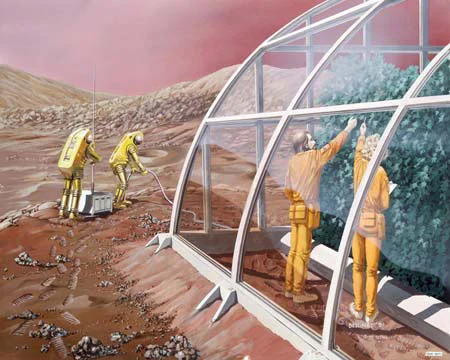If China or the US colonized Mars, would its inhabitants eventually declare independence from Earth?
Such a revolution would obviously be quite brutal and would likely be characterized by guerilla attacks against Earth paramilitary forces guarding key security installations and mining installations on the Red Planet.

Hopefully, administrators on Earth would ultimately conclude that doing business with a democratically elected government on equal footing would be far more profitable than trying to retain costly control of a planet from a distance.
Yes, we are getting ahead of ourselves, as humans have yet to set foot on the barren surface of Mars. However, that isn’t stopping SpaceX founder Elon Musk from looking past the current brouhaha surrounding NASA’s Mars rover Curiosity which has been tasked with exploring Gale Crater for signs of ancient life.

“I’m confident at this point that it can be done,” Elon Musk told Nightline when asked about sending humans to the Red Planet. “I think we’ll be able to send, probably, the first people to Mars in roughly 12 to 15 years. That’s my estimate.”
According to Musk, rockets designed by SpaceX are fully capable of sending probes and rovers to Mars, along with people and cargo to establish an initial base of operations.
“Mars is the only place in the solar system where it’s possible for life to become multi-planetarian. We could make Mars like Earth… it’s more than our life raft, it’s like backing up the biosphere.

“We know it’s possible to get there. You would be moving to Mars, so a round trip ticket, it has to be no more than half a million dollars, so roughly, a middle-class house in California, and at this point, I would say, I know it’s possible.”
The key, says Musk, is overcoming cost concerns by designing a reusable rocket.
“If you look at something like a Boeing 747 – that’s over a quarter of a billion dollars, buying a 747. You need two of them for a round trip. But nobody is paying half a billion dollars to fly from L.A. to London. It’s a few thousand dollars, and that’s because you reuse that aircraft multiple times, you use it thousands of times,” he explained.
“The acquisition costs – the cost of building that aircraft in the first place – is only a small portion of your ticket price,” he said. “If we could then have a reusable rocket, then the cost of the flight would be a lot closer to the cost of fuel.”

Nevertheless, Musk did concede that sending people to Mars would be one of the “most difficult” projects humanity has ever attempted.
“The Earth has been around for four billion years and in all that time, it’s been confined to one planet. That’s a long time… And now for the first time in almost four billion years, it’s been possible – very difficult, but possible – for life to extend to another planet. If we can take advantage of that opportunity, who knows how long that window will be open?”
Musk has been a proponent of colonizing Mars for quite some time. Back in August 2011, the billionaire impatiently questioned if humans were on the path to becoming a multi-planet species.
“[Because] if we’re not, it’s really not that exciting after all… [Remember], as soon as you’ve got a base on Mars, you’ve got a [real] ‘forcing function’ for improving the transportation capability,” he added.







